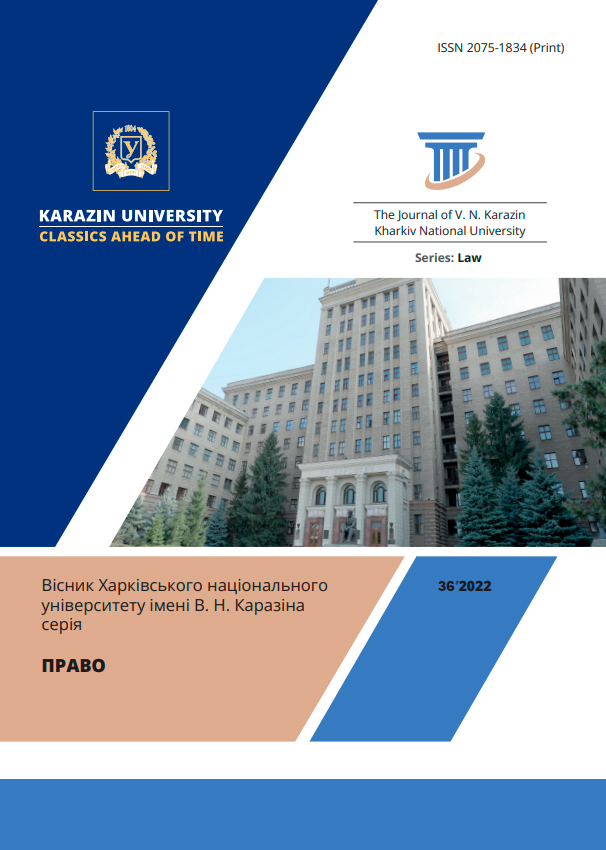Anonymous witnesses and the accused's right to a fair trial
Abstract
Introduction. The article examines the question of the questioning of anonymous witnesses, the use of their testimony at the stage of the trial in the context of the suspect’s or accused’s right to a fair trial. The criteria that allow to make a decision on granting anonymity to a witness in criminal proceedings are defined and three categories of anonymous sources are distinguished, such as statements of absent witnesses, statements of anonymous witnesses, statements of hidden or classified witnesses.
Summary of the main results of the study. The author refers to the criteria developed by the practice of the European Court of Human Rights on the issue of both the participation of anonymous witnesses during the trial and the use of the testimony of absent witnesses, which will ensure the fairness of the trial. Based on the practice of the ECtHR, three categories of anonymous sources have been identified, the testimony of which the ECtHR should consider as sources of evidence, and, accordingly, give them an assessment: they include: absent witnesses, anonymous witnesses, hidden or classified. Balancing factors that should allow for a fair and proper assessment of the credibility of evidence obtained from absent, anonymous, hidden or classified witnesses are given in order to prevent violations of Article 6 of the Convention on the Protection of Human Rights and Fundamental Freedoms.
Conclusions. The legislation of European countries allows investigations to be carried out with the help of anonymous sources. Considerable attention is paid to this issue in the normative acts of the European Union, in particular in the Convention on the Protection of Human Rights and Fundamental Freedoms, the Committee of Ministers of the Council of Europe, decisions of the ECtHR, etc. This is relevant from the point of view of the formation of domestic criminal procedural practice, since it clearly and consistently establishes the standards of admissibility as evidence from such witnesses, creates guarantees that national courts will observe the right of the accused to a fair trial on the one hand, and for anonymous witnesses - the right to safety - on the other hand.
Downloads
References
/References
Кримінальний процесуальний кодекс України від 13.04.2012 р. № 4651-VI. Відомості Верховної Ради України. 2013. № 9-10. № 11-12. № 13. Ст. 88.
Панасюк Т.І. Захист свідків і потерпілих у кримінальному процесі України : автореф. дис. ... канд. юрид. наук. Київ, 2009. 22 с.
Рекомендація No Rec (2005) 9 Комітету міністрів Ради Європи державам-членам щодо захисту свідків та осіб, які співпрацюють з правосуддям. URL: https://supreme.court.gov.ua/userfiles/Rec_2005_9_2005_04_20.pdf
Постанова Першої судової палати Касаційного кримінального суду у складі Верховного Суду від 10 вересня 2020 року, справа № 766/19891/17. Єдиний державний реєстр судових рішень. URL: https://reyestr.court.gov.ua/Review/91555090
Справа «Аль-Хавая і Тахері проти Сполученого Королівства» (Al-Khawaja and Tahery v. the United Kingdom) від 15 грудня 2011 року, скарги №№ 26766/05 та 22228/06. URL: https://hudoc.echr.coe.int/eng#{%22itemid%22:[%22001-108072%22]}
Справа «Мірілашвілі проти Росії» (Mirilashvili v. Russia) від 11 грудня 2008 року, скарга № 6293/04. URL: https://hudoc.echr.coe.int/eng#{%22itemid%22:[%22001-90099%22]}
Criminal Procedure Code of Ukraine dated April 13, 2012 No. 4651-VI. Information of the Verkhovna Rada of Ukraine, 2013. No. 9-10. No. 11-12. No. 13. Art. 88. (in Ukrainian).
Panasiuk T.I. Protection of witnesses and victims in the criminal process of Ukraine: autoref. thesis ... candidate law of science Kyiv, 2009. 22 p. (in Ukrainian).
Recommendation No Rec (2005) 9 of the Committee of Ministers of the Council of Europe to member states on the protection of witnesses and persons cooperating with justice. URL: https://supreme.court.gov.ua/userfiles/Rec_2005_9_2005_04_20.pdf (in Ukrainian).
Resolution of the First Judicial Chamber of the Criminal Court of Cassation as part of the Supreme Court of September 10, 2020, case No. 766/19891/17. Unified state register of court decisions. URL: https://reyestr.court.gov.ua/Review/91555090 (in Ukrainian).
The case "Al-Khawaja and Tahery v. the United Kingdom" dated December 15, 2011, complaints No. 26766/05 and 22228/06. URL: https://hudoc.echr.coe.int/eng#{%22itemid%22:[%22001-108072%22]} (in Ukrainian).
The Mirilashvili v. Russia case dated December 11, 2008, complaint No. 6293/04. URL: http://hudoc.echr.coe.int/eng#{%22itemid%22:[%22001-90099%22]} (in Ukrainian).
Copyright (c) 2023 Гліб Рибалко

This work is licensed under a Creative Commons Attribution 4.0 International License.




